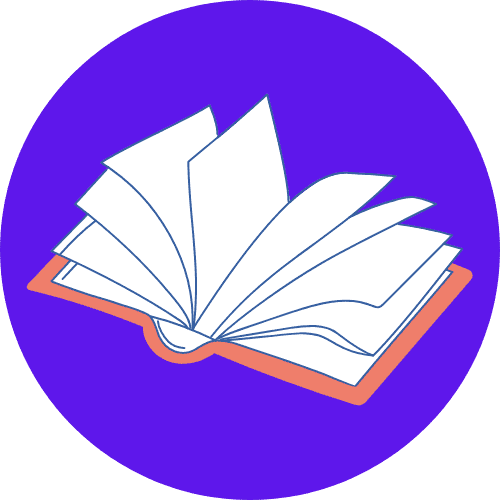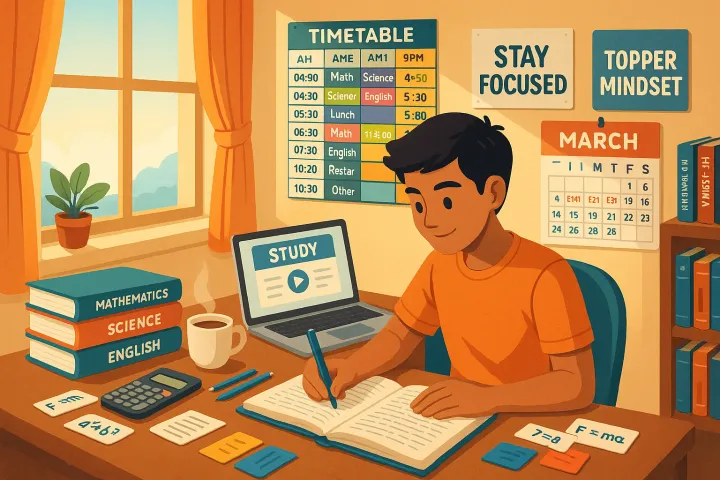Topper’s Daily Timetable for Class 12th Board Exams
This timetable is designed for Class 12th students (Science, Commerce, Arts) aiming to excel in CBSE (or similar board) exams in March 2026.

This timetable is designed for Class 12th students (Science, Commerce, Arts) aiming to excel in CBSE (or similar board) exams in March 2026. It allocates 8–10 hours daily, including school/coaching, with breaks for rest and recreation. The focus is on NCERT, past papers, and practical/theory balance, tailored for streams like Science (Physics, Chemistry, Math/Biology), Commerce (Accountancy, Economics), or Arts (History, Economics).
General Guidelines
- Syllabus: Download the latest CBSE syllabus from cbse.nic.in. Prioritize high-weightage topics (e.g., Calculus, Electrostatics, National Income).
- Resources: NCERT textbooks, HC Verma (Physics), TS Grewal (Accountancy), Oswaal Sample Papers.
- Habits: Make short notes, solve past 5–10 years’ board papers, practice under timed conditions.
- Health: Sleep 6–7 hours, exercise 20–30 minutes, limit phone use to 30 minutes daily.
- Progress: Track topics covered and test scores in a notebook.
Daily Timetable
| Time | Activity | Details |
|---|---|---|
| 4:00–4:15 AM | Wake Up & Warm-Up | Hydrate, light stretching to boost alertness. |
| 4:15–5:45 AM | Core Subject (1.5 Hours) | Math: 10–15 Calculus problems (NCERT/RD Sharma). Physics: Electrostatics numericals/derivations. Chemistry: Organic reactions. Economics: Macro concepts. |
| 5:45–6:15 AM | Revision (30 Minutes) | Revise formulas (Math/Physics), reactions (Chemistry), or concepts (Economics/History) from previous day. Use flashcards. |
| 6:15–7:00 AM | Breakfast & Prep | Healthy breakfast (e.g., eggs, fruits), light walk, or meditation. Prepare for school. |
| 7:00–8:00 AM | Quick Review/MCQs | Review notes or solve 5 MCQs (Physics/Chemistry/Economics). |
| 8:30 AM–12:30 PM | School/Coaching | Attend classes actively, take detailed notes, clarify doubts immediately. |
| 12:30–1:00 PM | Notes Review (30 Minutes) | Summarize school/coaching notes (1 page per subject). |
| 1:00–2:00 PM | Theory Subject (1 Hour) | Biology: Human Physiology. History: Modern India. Economics: National Income. Make 1–2 page notes. |
| 2:00–3:00 PM | Lunch & Rest | Healthy lunch, 15–20 minute power nap if needed. |
| 3:00–4:30 PM | Weak Subject (1.5 Hours) | Math: Coordinate Geometry. Physics: Mechanics. Accountancy: Cash Flow Statements. Solve 5–10 sample paper questions. |
| 4:30–5:00 PM | Writing Practice (30 Minutes) | Practice articles/reports (English) or long answers (History/Economics). |
| 5:00–7:00 PM | Practical/Numericals (2 Hours) | Physics/Chemistry: Practicals or numericals. Computer Science: Programs. Accountancy: 5 practical problems. Solve 1–2 past board questions. |
| 7:00–8:00 PM | Core Subject Practice (1 Hour) | Math: 10 problems. Chemistry: 5 reactions. History: 2–3 long answers. |
| 8:00–8:30 PM | Dinner & Break | Healthy dinner, relax (e.g., short walk). |
| 8:30–10:00 PM | English + Revision (1.5 Hours) | English: Read Flamingo/Vistas, practice comprehension. Revise day’s notes or solve 5 short-answer questions. |
| 10:00–10:30 PM | Sample Paper/Quick Revision (30 Minutes) | Solve 1 sample paper section (1–2 times weekly) or revise flashcards. |
| 10:30–10:45 PM | Plan Next Day | List 3–5 priority topics and resources for tomorrow. |
| 10:45 PM | Sleep | Ensure 6–7 hours of rest for optimal focus. |
Weekly Schedule
- Monday–Friday: Follow daily timetable, covering all subjects (2–3 daily).
- Saturday:
- Morning (3 Hours): Full-length mock test (Physics, Math, or Accountancy).
- Afternoon (2 Hours): Analyze mistakes, rework incorrect answers.
- Evening (2 Hours): Revise weak topics (e.g., Organic Chemistry, History themes).
- Sunday:
- Morning (2 Hours): Revise notes for all subjects (formulas, diagrams, concepts).
- Afternoon (3 Hours): Solve past 5 years’ board papers (Oswaal/Arihant).
- Evening (1 Hour): Light study (English literature) or relax.
- Plan next week’s goals and topics.
Monthly Goals
- August–November 2025: Complete 80–100% syllabus (3–4 chapters per subject monthly). Solve NCERT exercises.
- December 2025: 1st revision, focus on weak areas. Solve 2–3 sample papers per subject.
- January 2026: 2nd revision, practice past board papers (3–5 per subject). Work on answer presentation.
- February 2026: 3rd revision with notes/flashcards. Take 1–2 mock tests weekly.
- March 2026: Light revision, focus on high-weightage topics. Avoid new topics.
Subject-Specific Tips (Science, Commerce, Arts)
- Physics:
- Focus: Electrostatics (15%), Mechanics (20%), Optics (15%).
- Task: Solve 10 numericals, 2 derivations daily (NCERT/HC Verma). Practice practicals.
- Chemistry:
- Organic: Reactions, mechanisms (Aldehydes, Ketones).
- Physical: Numericals (Solutions, Electrochemistry).
- Inorganic: NCERT (p-block, d-block).
- Task: Solve 10 questions, revise 1 chapter daily.
- Mathematics:
- Focus: Calculus (35%), Vectors/3D (15%), Probability (10%).
- Task: Solve 15–20 problems daily (NCERT/RD Sharma).
- Biology:
- Focus: Human Physiology (20%), Genetics (15%), Ecology (15%).
- Task: Practice diagrams, solve 10 NCERT questions daily.
- Accountancy:
- Focus: Financial Statements (20%), Partnership (15%).
- Task: Solve 5–10 practical problems daily (TS Grewal).
- Economics:
- Focus: Macro (National Income, Money), Micro (Demand, Supply).
- Task: Make flowcharts, solve 5–10 questions daily.
- History:
- Focus: Modern India, World History.
- Task: Make timelines, practice 2–3 long answers daily.
- English:
- Focus: Literature (Flamingo/Vistas themes), writing (articles, reports).
- Task: Practice 1 writing task, read 1 chapter daily.
Topper’s Habits
- NCERT Focus: Solve all NCERT exercises (90% of questions are NCERT-based).
- Past Papers: Solve 5–10 years’ board papers to understand patterns.
- Short Notes: Create 1–2 page notes per chapter (formulas, diagrams, concepts).
- Time-Bound Practice: Simulate exam conditions (3 hours, no distractions).
- Doubt Resolution: Clear doubts same-day via teachers or platforms like Physics Wallah.
- Avoid Distractions: Limit phone use (use Focus@Will app).
Resources
- Physics: NCERT, HC Verma, DC Pandey.
- Chemistry: NCERT, OP Tandon, Arihant.
- Math: NCERT, RD Sharma, R.S. Aggarwal.
- Biology: NCERT, Trueman’s, MTG.
- Commerce: NCERT, TS Grewal, Sandeep Garg.
- Arts: NCERT, Oswaal Sample Papers.
Online: choose according to your need; we don't recommend any.
77 Motivational Quotes for Students
Words have the power to hurt, but they can also inspire. Consider how some of the most Motivational quotes of all time

Thanks, join our WhatsApp community for the latest updates.
SchoolOkay | WhatsApp Channel
SchoolOkay WhatsApp Channel. It’s a channel for sharing educational content. 0 followers

Thanks, and Share.






Comments ()